President Donald Trump enjoys far stronger support among members of the military than the American public at large, according to the latest scientific Military Times poll.
Yet while Trump is especially popular among enlisted troops, officers have a much lower opinion of him.
And women and minorities in the ranks share similar skepticism.
Overall, about 44 percent of all troops surveyed in the Military Times poll have a favorable view of Trump, while roughly 40 percent have an unfavorable opinion of him. That’s a stark contrast to opinion polls of the general public, which have shown Trump’s popularity at less than 40 percent and an unfavorable rating as high as 56 percent.
Yet, the poll of more than 1,100 active-duty troops, conducted in September, shows a deep divide over service members’ opinions of the commander in chief, whose first nine months in office have been marked by military policies that have drawn both praise and concern from Pentagon leaders.
While almost 48 percent of enlisted troops approve of Trump, only about 30 percent of officers say the same, the poll shows.
When asked specifically about Trump’s handling of military policies, about 55 percent of all troops surveyed rated Trump’s policies as favorable, versus 26 percent unfavorable.
The poll was conducted before the latest controversy surrounding Trump’s handling of phone calls to the families of fallen service members.
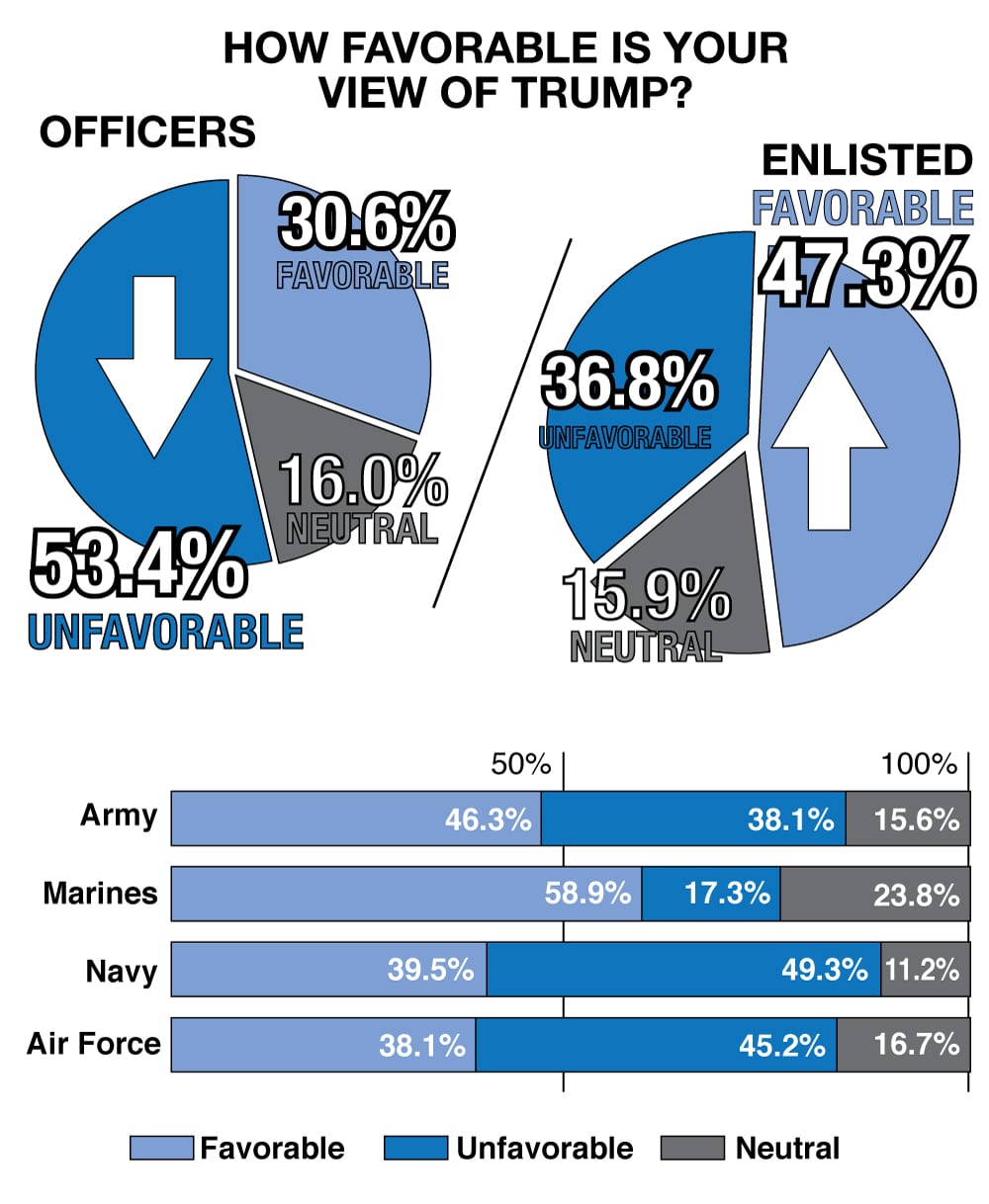
Troops’ views on Trump have changed very little since he was elected last year.
A similar Military Times poll conducted in late 2016, just before Trump took office, found about 46 percent of troops had a favorable view of Trump, while 37 percent had an unfavorable opinion of the incoming president. Both polls had a margin of error around 3 percent, making the shift in popularity figures slight, if at all.
“While he has done a number of things designed to appeal to the military, he hasn’t really moved the needle much,” said Peter Feaver, a White House official under former President George W. Bush who is now a political science professor at Duke University and has authored several books on military culture.
Military-related policies have been central to Trump’s first year in office.
His vows to boost military spending are popular, and his push to eliminate bureaucratic interference in battlefield decisions has received high marks from the troops. His pick for a secretary of defense, retired Marine Gen. Jim Mattis, has drawn widespread support.
However, he’s faced some pushback on his handling of the military. It remains unclear whether he can convince Congress to go along with a big budget increase for the Pentagon. The rollout of Trump’s Afghanistan strategy has faced criticism for being too vague. His push to reverse the Obama-era policy allowing transgender troops to serve openly has been controversial. And many troops question his handling of policy related to cyber warfare and Russia.
“Maybe all of his proposals are cancelling each other out,” Feaver said.
Phil Carter, director of the Military, Veterans and Society Program at the Center for a New American Security, said he thinks some of the support for Trump among troops may be “wish casting” for his policies.
“I think troops want Trump to succeed on his policies on military spending and strength,” Carter said. “Trump’s bluster plays well with the troops.”
Officer vs. Enlisted
Opinions on Trump, a controversial figure even within his own party, aren’t uniform throughout the services.
Enlisted service members are much more enamored with the president than officers. Almost half of all enlisted troops who responded to the survey said they have a favorable view of Trump. Among officers, it was less than one in three.
More than 53 percent of officers said they had an unfavorable view of the president.
Joseph Lobban, an intelligence soldier who retired last year as a sergeant first class, said the divide isn’t surprising.
“Enlisted people like a man who says what he means and would like to see the job done, no frills, no questions asked,” Lobban said. “From the way President Trump has presented himself, he has been that kind of person.”
For Lobban, Trump is an individual who speaks plainly and directly.
“That’s why I think enlisted people respect the man, because the man is set on his position and enforces it,” he said.
In contrast, one Navy lieutenant who asked to remain anonymous called Trump’s blunt talk distracting.
The Trump White House “seems extremely reactionary, verging on whimsical, when it comes to matters of international politics,” the Navy lieutenant said.
“They are also creating unnecessary division domestically and revisiting political battles that have already been settled and accepted, such as reinstating the transgender military ban.
“It causes so much upheaval, stress and wasted resources, and has a real impact on morale at the deckplate level.”
One retired Air Force colonel, who similarly asked for anonymity, called the officer-enlisted split shocking.
“I never thought that you would have a disparity in the numbers like that,” he said.
He suspects that Trump’s unpredictability is both the source of enlisted troops’ attraction to him and officers’ reservations.
“When you have a hierarchy like we have within the military, part of it is that there is respect for the chain of command,” he said. “What Trump may offer is, it doesn’t matter. He’s just going to say whatever he wants to say, regardless of what the expected norms are for that position.”
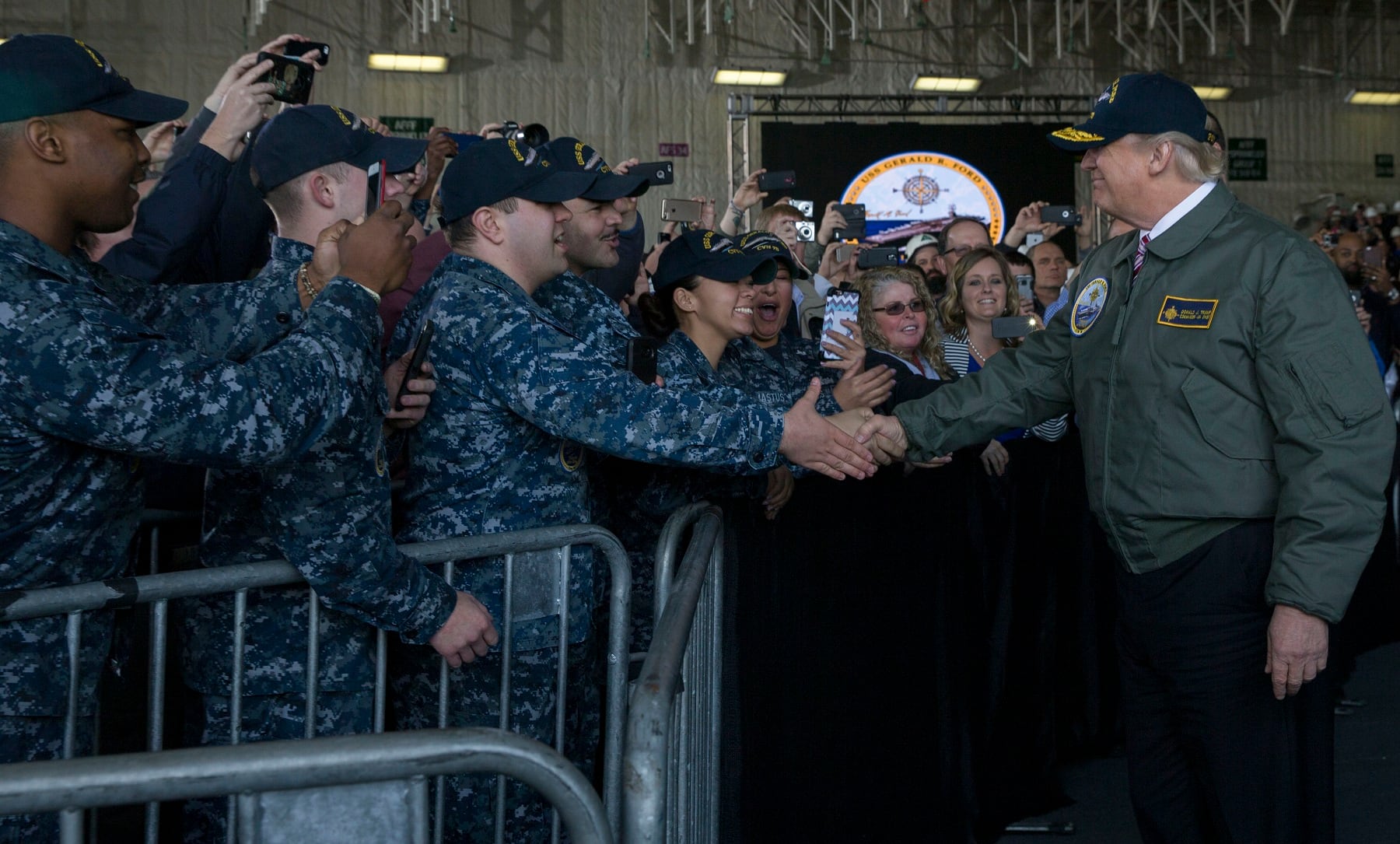
Breaking down the numbers
The officer-enlisted divide wasn’t the only large split revealed by the poll.
Military men were much more likely to support Trump than women (47 percent favorable for men, 32 percent for women).
Non-white servicemembers were much more likely to oppose the president (51 percent unfavorable) than white troops (37 percent unfavorable).
Among the individual services, Trump is least popular among sailors (49 percent unfavorable) and most popular among Marines (59 percent favorable).
Retired Marine Maj. Ross Schellhaas said he thinks Trump’s style may better match with stereotypes of young Marine Corps members than the other services.
“I think those young people come from the more conservative regions of our nation and tend to vote that way,” said Schellhaas, an Iraq and Afghanistan vet.
But Carter also said that Marines may be influenced by Trump’s cabinet.
“That’s the Mattis effect,” Carter said.
Mattis is arguably the president’s most well-regarded appointee, and he is especially beloved in the Marine Corps, specifically, and the military at large.
More than 84 percent of troops said they had a favorable view of Mattis, a rare point of agreement among the diverse military communities.
Trump’s chief of staff, retired Marine Gen. John Kelly, was less well-known among poll respondents but still had a nearly 59 percent favorable rating from troops surveyed against a 7 percent unfavorability response.
Reporters Stephen Losey, Kyle Rempfer, Jeff Schogol and George Altman contributed to this story.
RELATED
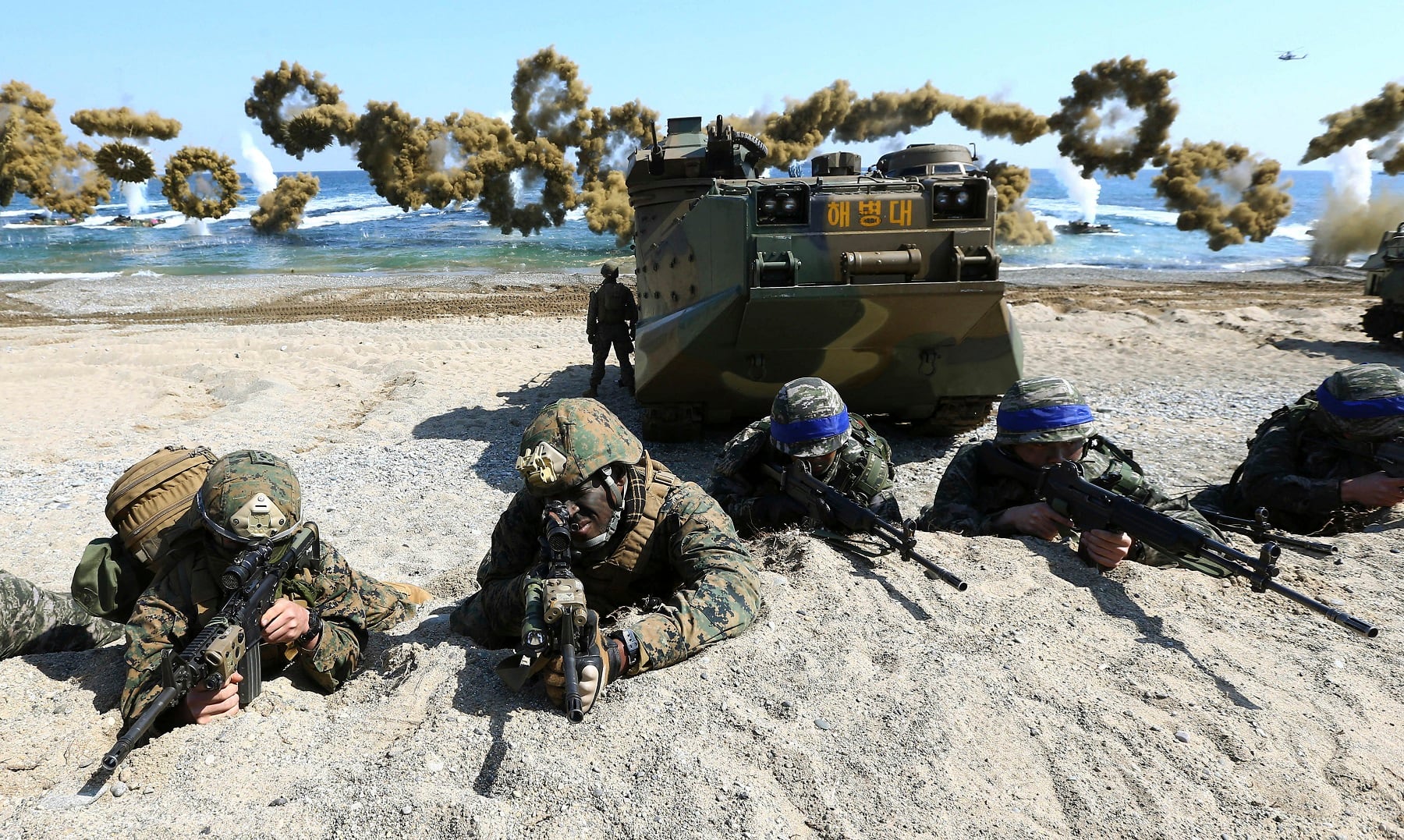
RELATED
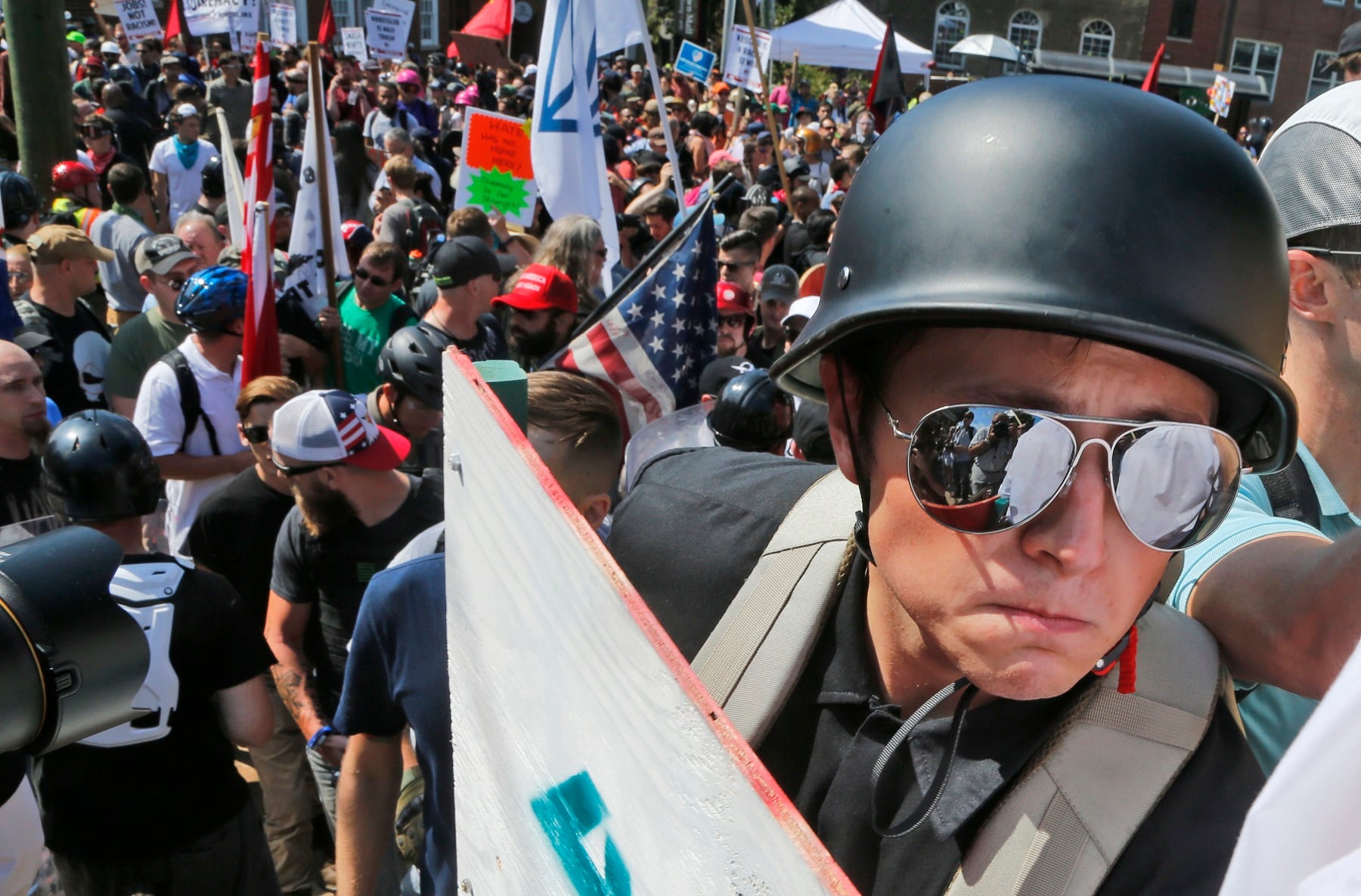
RELATED
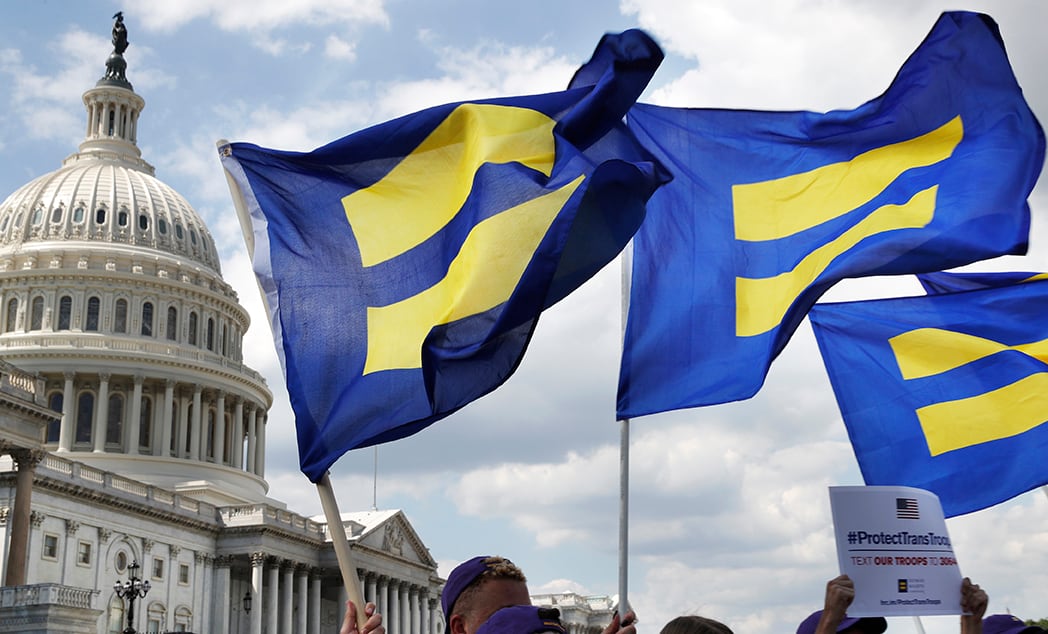
Our methodology
Between Sept. 7 and 25, Military Times conducted a voluntary, confidential online survey of U.S. service members. The questions focused on President Trump’s time in the White House and national security issues facing U.S. leaders.
The survey received 1,131 responses from active-duty troops. A standard methodology was used to estimate the weights for each individual observation of the survey sample. The margin of error was roughly 3 percent. The survey audience was 86 percent male and 14 percent female, and had a mean age of 30 years old.
The respondents identified themselves as 76 percent white, 8 percent Hispanic, 9 percent African American, 2 percent Asian and 5 percent other ethnicities. Respondents were able to select more than one race.
Leo covers Congress, Veterans Affairs and the White House for Military Times. He has covered Washington, D.C. since 2004, focusing on military personnel and veterans policies. His work has earned numerous honors, including a 2009 Polk award, a 2010 National Headliner Award, the IAVA Leadership in Journalism award and the VFW News Media award.



